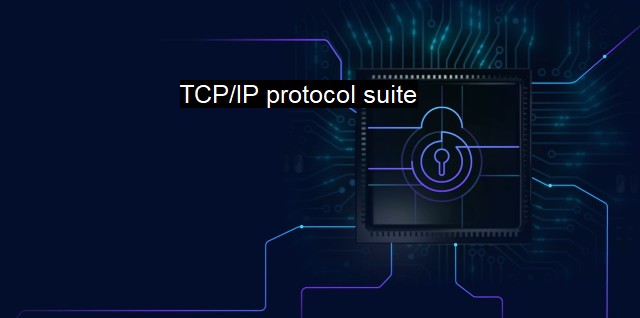What is TCP/IP protocol suite?
TCP/IP Protocol Suite: Fundamentals, Significance, and Usage in Cybersecurity and Antivirus Applications
The TCP/IP protocol suite is a foundational technology that operates as the backbone of the internet and the majority of private networks worldwide. As an essential aspect of cybersecurity and antivirus operation, understanding this system holds great importance.TCP/IP stands for Transmission Control Protocol/Internet Protocol. This forms a comprehensive collection or suite of communication protocols that allow systems to communicate over networks, governing the way data packets are sent and received over digital networks, mainly the internet.
When the context involves cybersecurity and antivirus function, understanding the TCP/IP protocol suite becomes a core necessity because these protocols', implementation lie at the heart of most internet-based attacks. Discrepancies in such systems, if compromised, can threaten network safety and expose data to risks.
A typical TCP/IP model consists of four layers – the Application Layer, Transport Layer, Internet Layer, and Network Access Layer. Each layer co-operates to deliver and receive data packets, performing as a cohesive system to ensure online communication works seamlessly.
The Application Layer involves protocols for distinct application programs to conduct communication. These protocols include HTTP and FTP. Its main task is to provide application services for the software running on a computer.
The Transport layer supports the connections between hosts. The two primary transport protocols under the TCP/IP model, Transmission Control Protocol (TCP) and User Datagram Protocol (UDP) come into play here. TCP establishes connections, ensuring packets arrive accurately and in the correct order, while UDP does not guarantee delivery, enabling faster communication.
Regarding cybersecurity and antivirus systems, the IP Layer or Internet layer demonstrates utmost significance. Data transferring across networks is monitored and controlled by this layer through protocols like IP (Internet Protocol), ICMP (Internet Control Message Protocol), and IGMP (Internet Group Management Protocol). Based on IP addresses, data packets are routed accurately from their source to receiving networks.
The Network Access Layer, also known as the Network Interface Layer or Link Layer, facilitates communication between the host and network hardware, converting IP addresses into Hardware (MAC) addresses, thereby ensuring effective data packet forwarding onto Ethernet cables, Wi-Fi, etc.
When security breaches are detected by an antivirus or other cybersecurity measure, attackers exploit software bugs, vulnerabilities in operating systems, or unpatched systems. These cyberattack strategies involve injecting malicious data into a system by threatening its TCP/IP-based communication. It's crucial to protect the TCP/IP stack or suite from these invasive strikes to save computers or networks from hackers or malicious events.
Certain precautions, such as the use of firewall protection, Data Encryption Standard (DES), port scanning detection, detecting IP spoofing, use of security tokens, installing the latest security updates, code obfuscation, proper configuration of the network and its devices, etc., can go a long way in safeguarding the TCP/IP protocol suite.
As an integral part of both cybersecurity and antivirus systems, understanding, safeguarding and properly maintaining the TCP/IP protocol suite is necessary face of the vast seas of the internet. TCP/IP allows for the seamless flow and connectivity of data packets that sustain large-scale networks like the internet.
These suite of protocols hold great importance as its mechanisms are frequently and primarily targeted during online attacks. Getting rid of software bugs, decreasing system vulnerabilities, and continuously implementing security patches and updates are some ways that can protect the TCP/IP suite from threats. Achieving effective cybersecurity and antivirus protection begins with the understanding and active protection of these simplified yet integral protocol layers of the TCP/IP model.

TCP/IP protocol suite FAQs
What is the TCP/IP protocol suite and why is it important in cybersecurity?
The TCP/IP protocol suite is a set of communication protocols used to connect devices to the internet. It is important in cybersecurity because it provides the foundation for secure communication between networks and devices. Understanding how TCP/IP works is essential for network administrators and cybersecurity professionals to identify and prevent potential security threats.What are the different layers of the TCP/IP protocol suite?
The TCP/IP protocol suite has four layers: the application layer, transport layer, internet layer, and network access layer. The application layer is responsible for communication between applications; the transport layer handles data segmentation and error control; the internet layer provides routing between networks; and the network access layer defines how data is transmitted over the physical network.How does antivirus software use TCP/IP to protect against malware?
Antivirus software uses TCP/IP by analyzing the data packets that are transmitted across networks. When a user downloads a file or visits a website, the antivirus software intercepts the data packets and scans them for malware signatures. If the file or website is infected, the antivirus software can block the malware from installing or executing on the device.What is the role of TCP/IP in securing remote access connections?
TCP/IP plays a crucial role in securing remote access connections by establishing secure channels between devices. For example, when a user connects to a network via a VPN, the TCP/IP protocol suite ensures that the data transmitted between the user's device and the remote network is secure and encrypted. This helps to prevent eavesdropping, data interception, and unauthorized access to sensitive information.| | A | | | B | | | C | | | D | | | E | | | F | | | G | | | H | | | I | | | J | | | K | | | L | | | M | |
| | N | | | O | | | P | | | Q | | | R | | | S | | | T | | | U | | | V | | | W | | | X | | | Y | | | Z | |
| | 1 | | | 2 | | | 3 | | | 4 | | | 7 | | | 8 | | |||||||